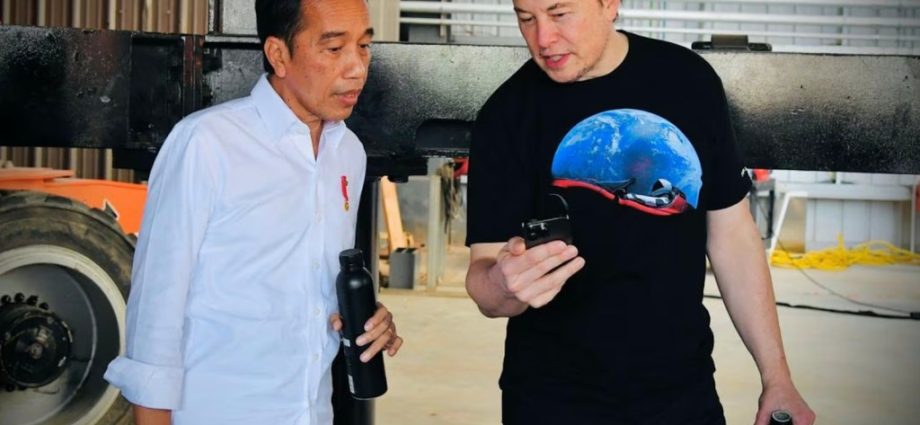JAKARTA – Taken aback by Elon Musk’s decision to use Malaysia as Tesla Inc’s Southeast Asia base, Maritime Affairs and Investment Coordinating Minister Luhut Panjaitan remains cautiously optimistic the world’s richest man will still invest in Indonesia’s ambitious electric vehicle (EV) supply chain.
After a low-key, two-and-a-half-hour August 3 meeting in San Francisco, which went on twice as long as expected, the multi-billionaire carmaker is said to have agreed to make a final decision on building a manufacturing plant by the end of the year.
Learning from past mistakes, when they annoyed Musk by making premature statements about his plans for Indonesia, Panjaitan and his negotiating team have said very little publicly about the outcome of the hastily arranged meeting.
A source close to Panjaitan said Musk was “very open about what he thinks” regarding Tesla and SpaceX, his spacecraft venture which has previously been offered an equatorial launch site on Biak island, off the northern coast of Papua.
Indonesia’s only public comment focused on a proposed collaboration with SpaceX subsidiary Starlink, which currently provides cheap internet access to more than 60 countries using over 4,000 small, mass-produced satellites in low Earth orbit.
Health Minister Budi Sadikin, who accompanied Panjaitan to the meeting, said Starlink was necessary to link schools and health clinics across marginalized and remote areas of eastern Indonesia, mostly Maluku and Papua.
Among the internet provider’s customers is Ukraine, which has found the service vital to maintaining communications across a countryside often devastated by Russian missile and artillery strikes.
Although it wasn’t touched on in the official release, the source said the two sides talked about a car-making investment of at least US$1 billion, but he indicated it may depend on whether the government is prepared to make significant concessions which have so far stalled negotiations.
“The problem is in our court because we have not allowed him to do what he wants,” he told Asia Times, referring to Musk. “The most important thing is that everyone has to know what they will get.”

Any concessions will have to be agreed to by the president and, as with mining giant Freeport McMoRan Copper & Gold’s ground-breaking contract three decades ago, will almost certainly require parliamentary approval.
Lawyers say Freeport could serve as a template, locking in tax rates and the choice of vendors and employees and other issues to ensure that future governments don’t change the rules of the game.
“Rules that are not subject to abrupt change at the whim of policymakers jumping to accommodate public sentiment or lobby pressure are critical for business continuity,” The Jakarta Post editorialized last year in discussing Musk’s cautious approach.
Analysts believe the government is particularly keen to bring Musk on board, not only as a credible EV pioneer, but also to balance investment away from China, which has dominated the local nickel industry and continues to pour billions of dollars into Indonesia.
“All agreed that a conclusion will be reached by the end of the year,” the source said, revealing to Asia Times plans for Musk to visit Indonesia as early as next month. “Tesla has to make some studies on a location and other nitty-gritty issues and then they will pull the trigger.”
Widodo wants to develop an entire EV production line, including the smelting of raw materials and battery and vehicle manufacturing to final vehicle assembly. But the window of opportunity for that to happen is closing fast.
Although Panjaitan has spent three years trying to lure Musk to Indonesia, the talks broke down in the latter part of last year, leading to speculation that the multi-billionaire had been deterred by the country’s “chaotic” regulations and other conditions.
Aides say it was only a few days before Malaysian Prime Minister Anwar Ibrahim’s announcement that Panjaitan learned to his annoyance Tesla was setting up a regional office and service center in Selangor, the state surrounding Kuala Lumpur.
Malaysia signed off on tariff-free imports of Tesla’s latest Model 3 and Model Y models, whose launch at Tesla’s Shanghai gigafactory contributed to the firm raising its EV production by 86% to 441,000 units in the first quarter of this year.
EV manufacturing in Indonesia has proceeded at a snail’s pace, partly because local government rules are proving to be yet another obstacle despite the urgency the Widodo administration attaches to developing the industry.
Only this week, Investment Minister Bahlil Lahadalia was forced to provide reassurances that a consortium led by South Korea’s LG Energy Solution was still on track to build an $8.9 billion integrated EV battery plant in Central Java.
“The investment ministry will keep overseeing the licensing process and ease LG’s investment in Indonesia so that they can realize it quickly and provide immediate benefits,” Lahadalia said in a direct reference to troubling regulatory issues.
Despite four rounds of meetings with Tesla in 2020-2021 – and Widodo’s much-publicized visit to SpaceX’s complex on the Texas gulf coast – the Indonesians have clearly had problems winning Musk over.
Panjaitan complained that Musk was making too many demands and that Tesla needed to meet domestic investment guidelines.

The tech mogul was reportedly put off by the government wanting EV investors to partner with the state-run Indonesia Battery Corporation (IBC) to allow for integrated development and promote technology transfers.
IBC is a holding company comprising Indonesia Asahan Aluminium (MIND ID), gold and nickel miner Aneka Tambang (Antam), petroleum company Pertamina and utility firm Perusahaan Listrik Negara (PLN), each of which holds a 25% stake.
It is a partner with LG Energy Solution, LG Chem, LX International, POSCO Future M and China’s Zhejiang Huayao in the LG-led consortium whose multi-phase project began with a $1.1 billion battery cell plant in Karawang, West Java.
Panjaitan claimed in August last year that Tesla had already signed contracts worth about $5 billion to buy materials for its lithium batteries from processing facilities concentrated in nickel-rich eastern Indonesia.

